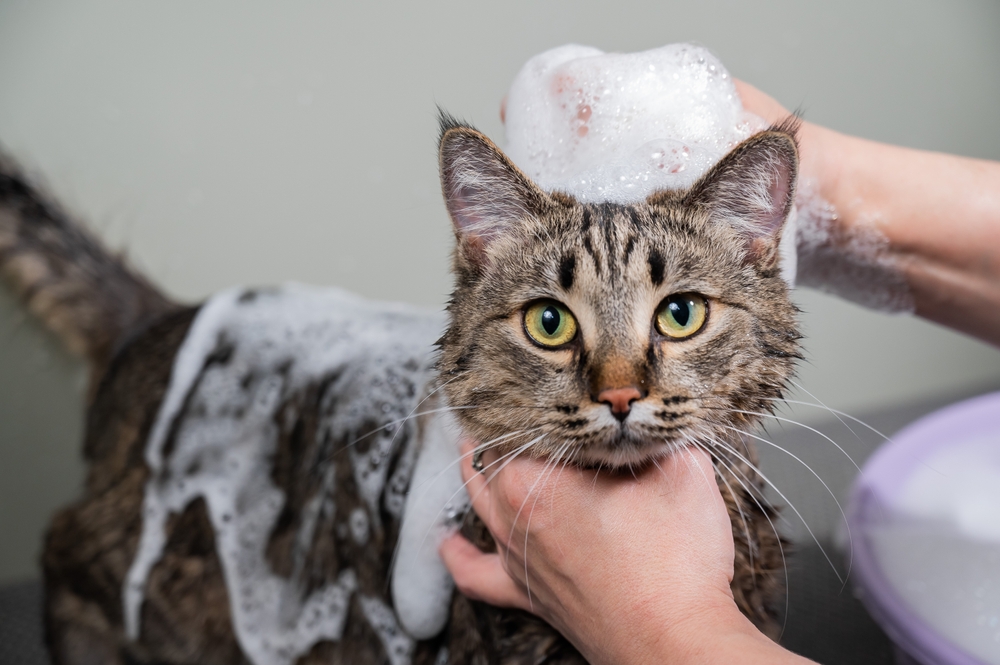Skin conditions are prevalent among cats and dogs, often causing discomfort, irritation, and sometimes hair loss and infection. Dermatological issues are one of the chief reasons pet owners bring their furry friends in for veterinary visits. Our Wellness Animal Hospital team explains the common types of pet skin conditions, signs, and treatments that can help you manage these issues so your four-legged friend can lead a healthy, itch-free life.
Skin conditions in cats
Skin issues in cats can take several forms, from intense itching and scratching to acne and scabs. The following are the more common dermatology problems in cats:
- Flea allergy dermatitis (FAD) — FAD is an allergic reaction to flea saliva. Some cats are incredibly sensitive to the proteins in the saliva, which cause an allergic reaction. Signs of FAD include intense itching, red bumps, hair loss, and scabs, particularly around the base of the tail. Our Wellness Animal Hospital team can prescribe flea control products, antihistamines, steroids, and antibiotics for secondary infections to treat flea allergy dermatitis.
- Ringworm — Despite the name, ringworm is caused by a fungal infection. It is highly contagious and transmissible through direct or indirect contact with contaminated objects. Ringworm in cats appears as circular, hairless, and scaly patches, which often affect the face, ears, and paws. Treatments include antifungal medications, shampoos, and environmental cleaning to prevent the infection’s spread.
- Miliary dermatitis — Often related to flea bites, allergies, or other underlying conditions, miliary dermatitis appears as small, crusty bumps primarily on the neck, back, and tail. Our team treats this condition by addressing the underlying cause and prescribing anti-inflammatory medications and soothing shampoos.
- Feline acne — Acne results from blocked hair follicles and oil glands, resulting in blackheads and pimples on the chin and lips. Treatments for feline acne include topical cleansers, antibiotics for infections, and changing feeding bowls to stainless steel or ceramic.
Skin conditions in dogs
Dogs, like cats, are also affected by skin issues. The following are some common skin disorders and how our veterinary team can treat them:
- Atopic dermatitis — Many dogs develop allergies to environmental allergens, such as pollen, grass, dust mites, mites, flea saliva, and mold. Atopy results in itchy skin, redness, ear infections, and hair loss. Treatments often involve antihistamines, steroids, immunotherapy (e.g., allergy shots), and frequent bathing with hypoallergenic shampoos.
- Hot spots — Often a result of chronic scratching, hot spots are raised, moist lesions on the skin. Many dogs who develop hot spots have allergies, parasites, or other skin disorders that contribute to the scratching and resultant hot spots. Our team treats hot spots by cleaning the affected area, using topical antibiotics, and providing advice on how to prevent further irritation.
- Pyoderma — This disorder is a bacterial infection of the skin and hair follicles. Signs of pyoderma include pustules, redness, and crusting, often accompanied by itching. We treat pyoderma using antibiotics and antibacterial shampoos, and addressing underlying causes, including allergies or parasites.
- Seborrhea — Seborrhea is caused by an overproduction of skin oils, which can be genetic or secondary to other conditions. Signs include greasy, scaly, or flaky skin, often with a foul odor. Treating seborrhea involves using medicated shampoos and dietary supplements and addressing underlying conditions.
- Mange — Caused by a mite infestation (sarcoptic or demodectic mange), this skin condition results in intense itching, hair loss, redness, and crusty skin. We treat mange by prescribing topical or oral medications and medicated baths, along with diagnosing and treating the underlying cause.
Prevention of pet skin conditions

Preventing skin issues in your furry friend involves several tactics, depending on the cause. The following methods can contribute to a healthier skin and coat:
- Grooming — Brushing your pet daily and bathing them regularly helps them maintain a healthy coat and skin and enables you to detect skin issues early.
- Flea and tick control — Our team prescribes preventive products for year-round protection against parasites, which can otherwise cause skin disorders.
- Balanced diet — A nutritionally balanced diet to support skin health can help prevent some skin irritations.
- Environmental management — Keeping your pet’s living area clean and free from allergens, including using air purifiers, can help prevent skin issues.
- Annual veterinary exams — Early detection and treatment of skin issues can prevent complications from developing. Our Wellness Animal Hospital team will ensure your pet’s diet, parasite prevention, allergy management, and other skin-related problems are addressed and effectively managed.
You can help your four-legged friend lead a comfortable, healthy life by recognizing and addressing skin conditions promptly. Skin disorders can be challenging for your pet, especially if they are constantly scratching and biting the spot that’s bothering them. Provide your pet with relief by scheduling an appointment with our Wellness Animal Hospital team.







Leave A Comment